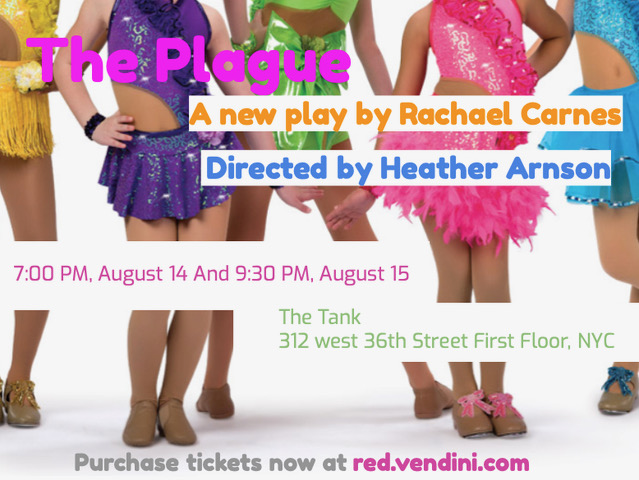Review: Catch "The Plague"
The Plague
Written by Rachael Carnes
Directed by Heather Arnson
Presented at The Tank
312 W 36th St., Manhattan, NYC
August 14-15, 2019
The Plague introduces us to a quintet of high school-aged women who comprise the remains of the Dancing Divas. Steph (Cali Elizabeth Moore) is the snarky, controlling captain (because her hoodie says so); Bella (Amy Bizjak), talented, athletic, and perhaps a little too enthusiastic, has body image and class issues and likes to slip kickboxing moves into her dancing; Katie (Valerie Terranova), the mediator of the group, is kind but can be a little slow to catch on; Daisy (Olivia Griffin) is prone to philosophizing in ways that sometimes make her sound like an academic critic; and Ashley (Hannah Myers), when we meet her, is focused on reuniting with her boyfriend but eventually becomes Steph's rival for leadership of the group. As the play begins, the five are holed up in a dance studio rehearsing a routine, and it doesn't take long for conflict to erupt, which includes Ashley announcing that she is giving her two weeks notice because Steph is too tyrannical. These dance-oriented disagreements also serve to introduce some of the themes of the play, with Steph wanting the routine to express—with big smiles, of course!—the existential terror and futility of the human condition (one wonders, given some of Steph's and Daisy's dialogue, if The Plague could be productively juxtaposed with the Albert Camus novel with which it shares a name) and Ashley countering that the judges just want to see the same representation of "young, innocent, servile ladies" that they always do, a desire that translates unfortunately easily to society more broadly. However, it also soon becomes apparent that the troubles within the group are not limited to artistic intention and that Steph has been sexually harassing Ashley. Confronted by Ashley, Steph maintains that she is just showing that she cares, and her unwanted to touching and invasion of personal space is dramatically effective even in the context of a staged reading. The play takes it time developing its characters and their interpersonal dynamics, building to the turn into its genre aspect in such a way that it comes across as surprising even as/if you are waiting for it. This turn, among other things, really concretizes the idea that it is not so easy to just leave a traumatic situation.
Before an additional unexpected turn at the end, The Plague engages with issues of art (Daisy, for example, wants the team to create art of lasting value, in a discussion that could also be seen as metacommentary), victim-blaming, empowerment (in the notion that the dancers' bodies could be weapons rather than only objects of in-some-elements-problematic aesthetic judgment), and what constitutes good leadership. One character's description of grief as an ever-present black dot that you can ignore some days and on other days feels all-consuming maps onto the trauma of a toxic workplace, as do debates over whether and how the Divas should take action to alter their current situation: after all, inaction in such an environment can itself be seen as a figurative plague or infection. The play deals with the feelings of isolation that can accompany such experiences, but also with the ability to forge ahead in their despite.
The cast, especially Bizjak, Terranova, and Moore, who gets to skillfully take Steph to some unusual places, do admirably within the limited staging in realizing this group of women, while in addition to reading the stage directions, Lindsey Knowlton provides some very nice zombie moans from offstage. The dialogue is consistently funny, including in the dancers' use of corporate-speak, sharp, and, for the most-part, fast-moving. It's easy to imagine what the kineticism and visual design of a full production could bring to this show, and so this is one Plague that we hope returns soon.
-John R. Ziegler and Leah Richards




Comments
Post a Comment